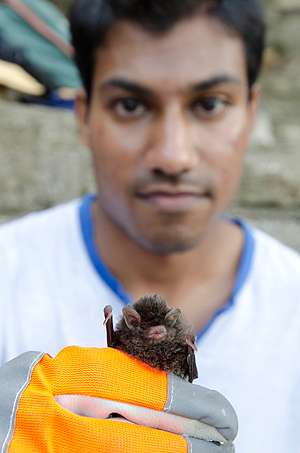Mozzies motivate the movements of microbats

(Phys.org) —Picnic saboteurs or valuable food source? While the humble mosquito is not welcome buzzing around and sharing viruses with humans, it has a valuable ecological role to play as a prey item for insectivorous bats, research contributed to by the University of Sydney has found.
Balancing the competing needs of environmental conservation and human health is critical. As urbanisation threatens wildlife and its habitats the very wildlife we are trying to protect may sometimes pose risks to our own health.
"Despite decades of work investigating the role of mosquitoes in spreading disease, we still don't know how important they are to our coastal ecosystems," said Dr Cameron Webb, from the University's Department of Medical Entomology and Westmead Hospital.
Dr Cameron Webb joined a multi-disciplinary team led by Dr Leroy Gonsalves at Australian Catholic University to examine the role of mosquitoes as prey for bats as part of a broader project investigating potential indirect effects of mosquito control on the diet of small forest bats.
Findings of this study, "Foraging Ranges of Insectivorous Bats Shift Relative to Changes in Mosquito Abundance," were published today in PLOS ONE.
The article presents the results of a radio-tracking study in which the research team tracked the movements of a small (4g) bat species Vespadelus vulturnus, little forest bat during two periods of contrasting extremes of mosquito abundance.
Vespadelus vulturnus, a predator of mosquitoes, shifted from foraging in endangered coastal saltmarsh to endangered coastal swamp forest communities.
"The shift in foraging range of V. vulturnus was relative to changes in abundance of mosquitoes (and no other prey) in these two habitats, highlighting the importance of mosquitoes as prey for this bat species," Dr Gonsalves said.
This study was the first in Australia to provide quantitative data about the importance of mosquitoes to insectivorous bat diet by assessing whether foraging ranges of predators shift in relation to mosquito abundance and distribution. Important recommendations that may be applied to the management of pest and vector mosquito species while protecting local wildlife that use these as prey are also presented in the article.
"This research is critical for the development of strategies that can reduce mosquito-borne disease risk while protecting our local mozzie eating wildlife," said Dr Webb.
More information: www.plosone.org/article/info%3Adoi%2F10.1371%2Fjournal.pone.0064081
Journal information: PLoS ONE
Provided by University of Sydney











.jpg)






